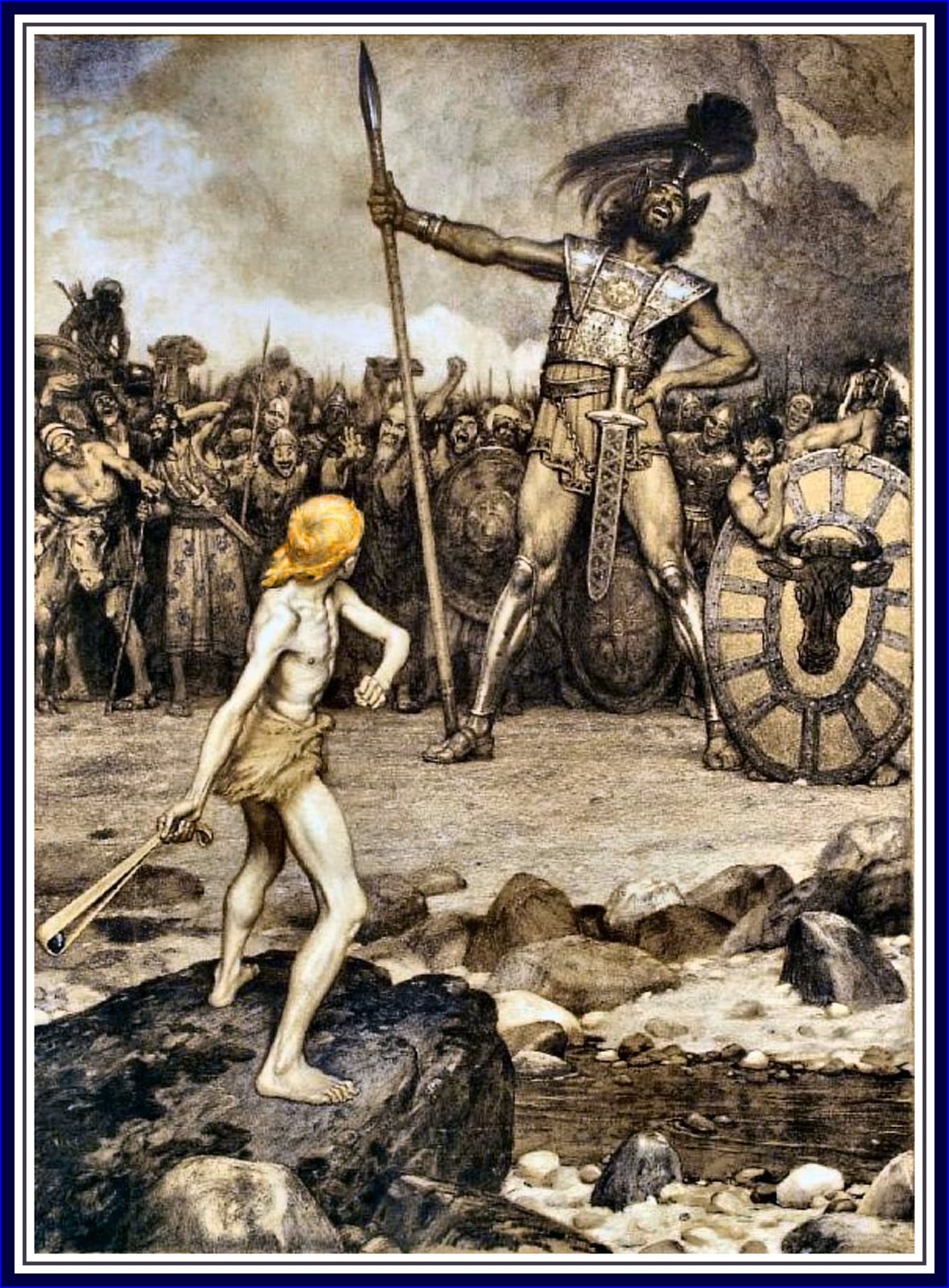Texts: I Samuel 17:1-49, Psalms 9:9-20, II Corinthians 6:1-13, Mark 4:35-31
Apple Podcasts released listening recommendations Saturday morning for our newest federal holiday, Juneteenth. On that list is a local podcast called Seizing Freedom, hosted by Dr. Kidada Williams and produced by our local public radio and television station, VPM. I recommend this podcast also, not because I work at VPM (which I do) or because I’m one of the voice actors in it (which I am), but because it pertains to this morning’s Old Testament text.
Seizing Freedom tells the story of the Black experience following Emancipation in the words of the people who lived that experience. While the Emancipation Proclamation freed enslaved Americans on paper, it did nothing to ensure their full rights as equal citizens under the law. Former enslavers did everything they could to limit that freedom by creating rules and laws that made it virtually impossible for the newly freed people to succeed.
And still, like air they rose.
Through ingenuity and determination – and because the Black community didn’t accept the rules that stacked the deck against them – African Americans fought the white establishment every step of the way to enshrine their rights in to law, cement their place as rightful citizens of this country, and seize their freedom. They fought then and their fight continues to this day.
When I first saw that today’s lectionary text was David and Goliath, I thought I’d hit the jackpot. Everyone knows David and Goliath – the sermon almost preaches itself. I could read the story, drop the mic, and exit stage left.
But writing a good word – one that I believe to be uplifting while also true to my best understanding – proved more daunting than I initially anticipated. I don’t completely buy a lot of the theology in this story. It does not agree with how I understand my Christian faith. I want a story where David and the giant resolve their differences, hug it out, and go for ice cream after. My faith, paired with a healthy dose of Disney movies, teaches me that enemies can become friends.
That’s not the case here. We don’t get the backstory about why Goliath is a bully – how kids teased him for being so big or how his family never really “got” him. He doesn’t learn his lesson, so he can be a better giant the next time. There is no “next time” for Goliath.
This is a story without psychological nuance. It’s cut and dry – David on one side of the valley, Goliath on the other. Good guy versus bad guy, like an old western, and the guy in the white hat wins.
As I was digging for some-kind-of good word, I had the great good fortune to re-read Malcolm Gladwell’s book, David and Goliath: Underdogs, Misfits, and the Art of Battling Giants. In it, Gladwell peels back the historical and contextual layers of this familiar story and finds that this tale isn’t a showdown at high noon at all. “David and Goliath” is not about a helpless shepherd boy winning against all odds when confronted with a fairy-tale giant. Like Seizing Freedom, “David and Goliath” is a story of desperation, ingenuity, and not playing by a set of bogus rules. It’s a story about creative resistance.
The Valley of Elah, where the battle takes place, was a disputed boundary between Judah and Philistia. The Israelites lived in the northern mountains of Judah. The Philistines were seafarers in the south and they were expanding their kingdom eastward – meaning they were wiping out cities and taking their territories. They marched from the south to capture the Judean mountains and essentially split Saul’s kingdom in two, making it easier to conquer.
The two armies met in the Elah Valley, the Philistines camped on the southern ridge and Saul’s forces camped on the northern ridge, with the valley in between them. Neither dared cross the valley – for the other would have the high ground and any army advancing up the mountain would be slaughtered. They were at a stand-off.
To break the stalemate, the Philistines sent their champion, Goliath, to resolve the situation with a one-on-one battle. He’s enormous. He’s formidable. He’s battle-ready. The more reliable texts have Goliath at 6 feet, 9 inches – towering over everyone in a time where modern nutrition and medicine are unheard of. He’s decked out in the latest and greatest armor and weaponry – making him virtually impenetrable, save his forehead.
He challenged the Israelites, “Choose you a man for yourselves and let him come down to me. If he is able to fight with me and kill me, we will be your servants; but if I prevail against him and kill him, then you shall be our servants and serve us.”
It was not unusual in the ancient world for armies to use champions to decide battles. It was called “single combat,” and it pitted two warriors against each other in a hand-to-hand fight to the death. This practice saved lives on both sides, and it relied upon each side honoring the bargain that the last man standing won the battle for his entire army. But there were rules of engagement – and Goliath expected those rules to be honored.
He said, “Give me a man that we may fight together.” He assumed, like all other single combat situations, that he would fight hand-to-hand with another warrior. This was, of course, to his advantage. He’s a tank. How could he lose?
Everybody knew he had the advantage – including David, including Saul. Anyone fighting Goliath, using his rules and on his terms, would be torn to shreds. Therefore, David had absolutely no intention of fighting Goliath by honoring an arbitrary rule meant to eliminate him.
David had other plans because David had something up his sleeve – something Goliath didn’t know. David may have been just a shepherd boy, too small to wield a sword, but – as it turns out – he was also a slinger.
Ancient armies had three types of warriors: the cavalry who rode on horseback or in chariots, the infantry who fought on foot with swords, and the artillery – not guns, but archers and slingers. Slinging took an enormous amount of skill and practice – but in the right hands, a slinger could spin a small rock around and around in a leather pouch and release it at speeds of over 111 feet/second – comparable to a midsize handgun. And slingers were accurate to the point that they could hit a moving target dozens of yards away. There are records of slingers killing birds in mid-flight.
Goliath was infantry – he fought on foot with swords. The right slinger could penetrate even the best armor where a sword could not. David knew that if played to his skills and not the giant’s expectations, he’d win.
And yet, no one expected him to do it. It’s like when Indiana Jones meets the expert swordsman in the streets of Cairo. We expect an elaborate showdown with swords and whips and somersaults, because that’s what an honorable warrior would do – fight the challenger on the challenger’s terms. Instead, Indy pulls the gun from his holster, shoots the swordsman, and continues his chase. We forgot a gun was even an option.
That’s what a western showdown at high noon is about – an honorable duel between otherwise equal rivals. Except that this isn’t equal. Goliath is setting the rules so that he’ll win. There’s nothing honorable in David losing to Goliath when he doesn’t stand a chance. There’s nothing to gain in that sacrifice.
Even King Saul expected them to fight Goliath on his terms. He prepared David for hand-to-hand combat, dressing him in his own armor, giving him his own sword. But it was clunky and David couldn’t move. Dressed like Goliath, David couldn’t play to his strengths. He knew he had the advantage if he took the field on his terms. He took down lions and bears with that sling – he planned to do the exact same thing to Goliath.
When David stepped into that valley, it was already over for Goliath. David had the superior weapon, he had the skill, and he had the audacity to get creative and fight his own way – because he had no other choice. The Philistines forced Israel into this corner. It was a matter of survival – for David and for his people. If he did not win, the Israelite army – including his brothers – would be slaughtered, and his people enslaved to the Philistines. Saul knew the danger Israel was in – and he was desperate enough to send a shepherd boy where his best warriors wouldn’t go.
Goliath didn’t see it coming. Gladwell reckons that Goliath had a condition called acromegaly, caused by a benign pituitary gland tumor that secreted excess growth hormone. The excess hormone caused Goliath to continue growing long after puberty, which is why he was so big. It is the same condition that Andre the Giant had. Those who suffer with acromegaly often have other complications, such as blurred vision and joint pain.
Goliath called out, “Let him come down to me.” He was moving slow because of his size, and because he carried the weight of all that armor and all those weapons. His joints were hurting, and he couldn’t see where he was going. Of course, he wanted the champion to come to him – where he could see him and crush him.
He literally did not see David coming. By the time he did, by the time he realized that the rules changed, it was too late. Within seconds of David’s warning, Goliath was face-first in the dirt with a rock in his forehead and a boy tugging at the sword strapped to his back in order to kill him.
This isn’t a Pixar ending. There’s no ice cream. It’s brutal and, for Goliath, it was final. And the cynic in me whispers: This is the moment that launched David’s bid for king.
So what do we do with this story – told to our children from the time they are toddlers – when the Gospel commands us to love our enemies, not slaughter them? What do we do with the giants in our lives who cannot be reasoned with, who don’t want to hug it out and get ice cream?
We have to be very careful when we name those giants. It’s easy and it’s dangerous to call people who disagree with us “the enemy.” It sets up a conflict that places God on our side and all the bad people on the other. And when we believe that there are people in this world who deserve a rock between their eyes, we will allow ourselves to commit all kinds of atrocities in the name of our faith.
But with that said, we also need to acknowledge that we don’t live in a Disney world. There are powerful people with selfish intent who benefit by dividing us and who live off the service of others. There are people of privilege who use their influence to maintain their privilege and to keep those who would upset the order in their place. And there are those who make rules by which only they can win, who place little value on people who aren’t like them, and who live in comfort and security at the expense of others who suffer and die to support their lifestyle.
I would like to believe this isn’t so. I want to believe Jesus’ version of Kingdom of God, the one he preaches about just before he gets on that boat – the happy place where scrub trees and weeds are valued just as much as the sheaves of grain, and where bunnies and birds are welcome even though they chew up your garden. It’s a kingdom where the rules of conduct and the rules of engagement are abandoned in exchange for the rule that everyone is welcome.
So it is ultimately ironic that we are so often told by the church, by our representatives, by law enforcement that if we live by their rules that keep us separate, if we submit to their terms that prevent us from reaching our full potential, if we do as our leaders expect us to do and not make waves then we can achieve the Kingdom of God – if not here and now, then in the great beyond. They tell us that God will give us a great reward in heaven because we lived by someone else’s rules.
But let me say this: There is no honor living by rules that are meant to hamstring and oppress. And there is no honor dying by those rules. It’s a pie-in-the-sky theology that allows the powerful to keep their power at the expense of the powerless, and it’s does not now, nor has it ever, served God’s people.
If we don’t question the rules, step out of those expectations, get creative and resist, then we will never beat the giant at his own game. We’ll never experience resurrection here and now, in our communities. We’ll never experience the promise of new life that revives our world and provide opportunities for us all.
We must know who we are fighting, we must play to our strengths, and we must get creative. If we hope to create a community where everyone is valued and everyone has what they need to live – to get closer to shalom and wholeness and equity – we cannot keep playing by their rules. Powerful forces will try to stop us, but like Goliath – they have disadvantages too. They move slowly and they can’t see a future where we all have a place at the table. We need new ways of engagement, new ways to take on that giant.
But most importantly, we must decide which side of the valley we are on. Strength can look like truth, but it isn’t. Power can look like God’s favor, but it isn’t. God is the master of the Valley of Elah – not Saul, not David, and certainly not Goliath. Jesus is the master of the storm – and it’s a fearful thing to realize that we may not be in control of anything.
Except one thing: We control whose side we are on. We can continue to reach out to those who would exploit, who would harm, who would destroy for their own benefit – reach out a loving hand with the hope of a better world steeped in equity, peace, and justice. And when we are called into the valley to battle, we can choose to side with the oppressed, the disenfranchised, the ones in the margins. We can stand with them against the giants. And we can fight on our own terms.
Michelle Obama tells her children, “When they go low, we go high.” When they make the rules and change the laws so that only they can win, when they deny history and science and enforce the teaching of mythology and lies, when they defend those who would overthrow our government and gun down unarmed people of color in the streets – then we will pull out our five smooth stones of truth, justice, kindness, peace and love. And we will fight.
Hopefully it won’t end with one of us in the dirt.
Hopefully, in the end, we can all go get ice cream.
Preached at Poole Christian Church, June 20, 2021.



Average Rating